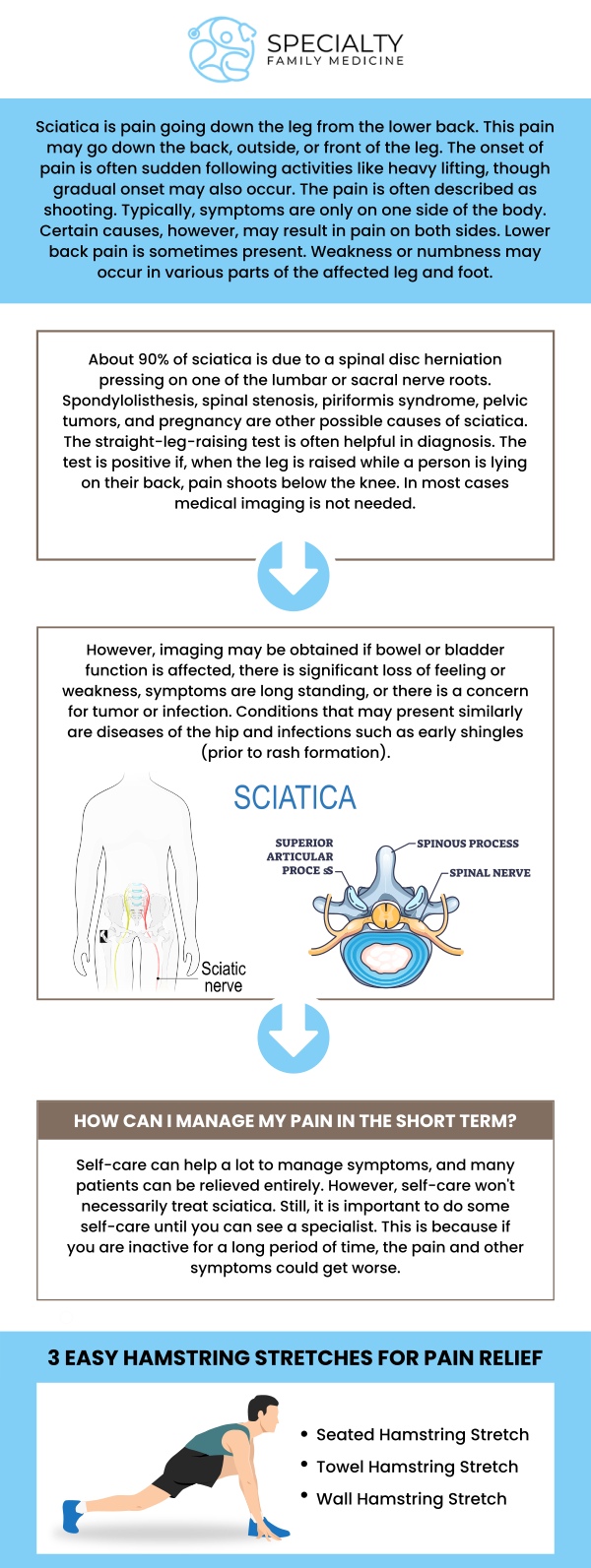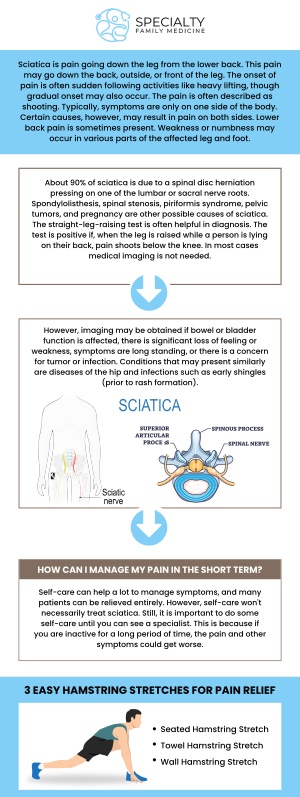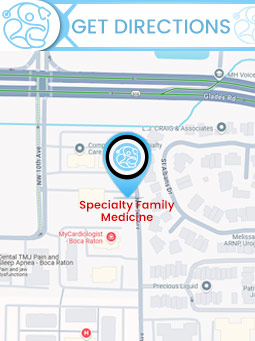Sciatica Treatment Doctor in Boca Raton, FL
Sciatica is a condition characterized by pain that radiates along the sciatic nerve, typically starting in the lower back and extending down one leg. It is often caused by compression or irritation of the nerve, usually due to a herniated disc or spinal stenosis. Symptoms may include pain, numbness, tingling, and weakness in the affected leg. At Specialty Family Medicine, Board-certified Dr. Ayokunle Fatade offers personalized treatment options to manage sciatica and improve your quality of life. For more information, contact us today or schedule an appointment online. We are conveniently located at 1599 NW 9th Ave, Suite 4, Boca Raton, FL 33486.


Table of Contents:
What is Sciatica?
What Are the Symptoms of Sciatica?
What Causes Sciatica?
How Long Does Sciatica Pain Last?
Why Choose Dr. Ayokunle Fatade for Sciatica Treatment at Specialty Family Medicine in Boca Raton, FL?
Sciatica refers to pain that radiates along the sciatic nerve, which runs from the lower back through the hips, buttocks, and down each leg. This condition typically occurs when the sciatic nerve is compressed or irritated, often due to a herniated disc, spinal stenosis, or other back issues. Sciatica is not a condition itself but a symptom of an underlying problem affecting the nerve. The pain can range from mild to severe and is usually felt on one side of the body. Although sciatica often improves with time and conservative treatments, it can be chronic or severe in some cases, requiring more advanced medical interventions. In addition to pain, sciatica can cause numbness, tingling, and weakness in the affected leg. Sciatica is common among individuals with poor posture, those who sit for extended periods, or people who are overweight. Treatment typically focuses on relieving pain and addressing the underlying cause of nerve compression.
Sciatica symptoms can vary depending on the severity of the nerve compression and the underlying cause. Common symptoms include:
• Radiating Pain: Pain typically starts in the lower back or buttocks and radiates down one leg, often reaching the foot or toes.
• Numbness and Tingling: A “pins and needles” sensation may occur in the affected leg, especially the thigh or calf.
• Weakness: Muscle weakness in the leg or foot, making it difficult to stand, walk, or move the leg properly.
• Burning or Shooting Pain: Some people experience sharp, shooting pain that comes in bursts and worsens with movement or prolonged sitting.
• Difficulty Moving: Reduced flexibility and mobility due to pain or weakness in the leg.
• Worsened Symptoms with Movement: Pain often increases with actions such as bending, twisting, or coughing.
These symptoms may fluctuate in intensity and can improve or worsen depending on the cause and treatment of the condition.
Sciatica is commonly caused by pressure or irritation on the sciatic nerve, typically from issues in the spine. Some common causes include:
• Herniated or Bulging Discs: When the discs between the vertebrae in the spine bulge or rupture, they can press on the sciatic nerve, leading to pain and discomfort.
• Spinal Stenosis: Narrowing of the spinal canal can cause pressure on the sciatic nerve, resulting in pain and weakness.
• Degenerative Disc Disease: As the discs in the spine wear down over time, they can cause nerve compression, leading to sciatica.
• Spondylolisthesis: When a vertebra slips out of place, it can compress the sciatic nerve, leading to pain.
• Piriformis Syndrome: The piriformis muscle, located in the buttocks, can tighten or spasm, pressing on the sciatic nerve and causing pain.
• Injury or Trauma: Direct injuries to the lower back, such as from a fall or accident, can cause sciatica.
In many cases, a combination of factors contributes to sciatic nerve compression.
The duration of sciatica pain can vary significantly depending on the underlying cause, treatment, and individual response to care. For many people, sciatica improves within a few weeks to a few months with conservative treatments like rest, physical therapy, or over-the-counter pain relievers. In these cases, the pain gradually decreases, and mobility improves over time.
However, in some individuals, sciatica can persist for several months or even become a chronic issue, especially if the underlying cause, such as a herniated disc or spinal stenosis, is not addressed. Severe cases, particularly those with nerve compression or progressive weakness, may require more advanced treatments like prescription medications, corticosteroid injections, or even surgery. If sciatica lasts for more than 3 months or worsens despite conservative treatment, it’s important to seek medical attention for further evaluation and a tailored treatment plan. Early intervention often leads to a faster recovery and better management of symptoms.
At Specialty Family Medicine, we are dedicated to providing personalized and effective sciatica treatment tailored to your unique needs. Led by board-certified Dr. Ayokunle Fatade, our clinic combines advanced treatments with compassionate care to help you manage and overcome sciatica pain.
Personalized Treatment Plans with Dr. Ayokunle Fatade
Dr. Ayokunle Fatade takes the time to understand your symptoms and medical history to create an individualized treatment plan. This approach ensures that each patient receives care suited to their specific condition, maximizing the chances of a successful recovery.
Dr. Ayokunle Fatade’s Focus on Long-Term Relief
At Specialty Family Medicine, we don’t just focus on short-term pain relief. Dr. Fatade’s goal is to provide long-term solutions by addressing the underlying causes of sciatica and promoting healthier lifestyle habits. We guide you in making changes to prevent flare-ups and improve your overall quality of life.
Expert Care with Dr. Ayokunle Fatade in a Comfortable Environment
Dr. Fatade’s experience and expertise in treating sciatica ensure that you receive the highest standard of care. Our clinic is dedicated to creating a welcoming and supportive environment where you can feel confident and comfortable throughout your treatment journey.
For more information, contact us or schedule an appointment online. We are conveniently located at 1599 NW 9th Ave, Suite 4, Boca Raton, FL 33486. We serve patients from Boca Raton FL, Highland Beach FL, Lighthouse Point FL, Kings Point FL, Delray Beach FL, Deerfield Beach FL, Boynton Beach FL, and surrounding areas.

Additional Services You May Need

Additional Services You May Need
▸ Back Pain
▸ Neck Pain
▸ Neuropathy
▸ Arthritis
▸ Sciatica
▸ Chronic Pain
▸ Motor vehicle accident
▸ Crohn’s Disease
▸ Parkinsons
▸ Post Surgical Pain
▸ Headaches
▸ Migraines
▸ Achilles Pain
▸ Foot Pain
▸ Plantar Fasciitis
▸ Elbow Pain
▸ Tennis Elbow
▸ Joint Pain
▸ Shoulder Pain
▸ Irritable Bowel Syndrome
▸ Overweight/Obesity
▸ Chest Pain Syndrome
▸ Osteoporosis
▸ Endometriosis
▸ Menstrual Pain
▸ Rheumatoid Arthritis






